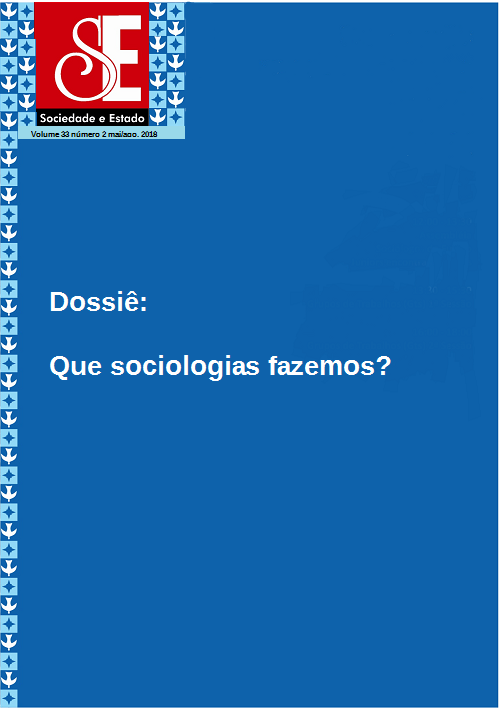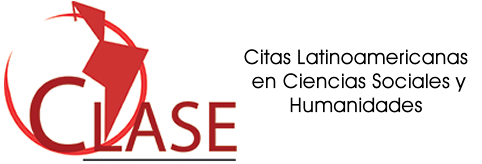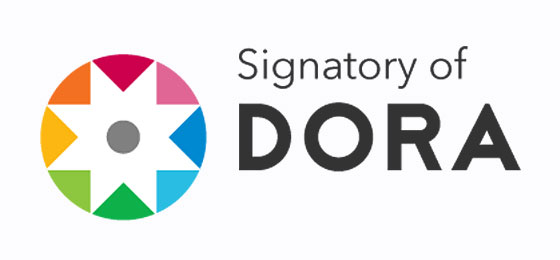Social sciences and representations:
a study of representative phenomena and social processes, from local to global
DOI:
https://doi.org/10.1590/s0102-699220183302007Keywords:
Collective Representations, Ordinary Knowledge, Representative Phenomena, Social processesAbstract
The purpose of this article is to examine the potential contribution that the study of representations - an approach developed in the field of social psychology - can bring to the social sciences. At the outset, the discussion is based on the observation of the social sciences' emerging interest in the relation between ordinary and scholarly knowledge, the social inscription of cognitive processes, the importance of the notion of "common", the need to reconfigure the relationship among disciplines, and that of considering the complexity of phenomena when addressing them. The examination of the notion of social and/or collective representation within the history of the social sciences, notably in Anthropology, History and Sociology, falls on the recognized properties of representative phenomena and on their roles in social life. The lines of problematization of this study are presented in a table summarizing the research space that concerns them. After discussing the scientific and political critiques of 'representationalism', a scheme that places representative phenomena at the intersection of three spheres: subjective, intersubjective, and transsubjective allows us to show the pertinence of the study of social representations in a globalized space. This pertinence is illustrated by works dealing with the effects of globalization vectors on local social identities, and by the positions adopted by Latin American researchers regarding the importation of models borrowed from the dominant circles of the first world.
Downloads
References
ABELÈS, M. Anthropologie de la globalisation. Paris: Payot, 2008.
ALMEIDA, A. M. O.; JODELET, D. (Eds.). Interdisciplinaridade e diversidade de paradigmas. Brasília: Thesaurus, 2009.
AMBOISE, B.; CHAUVIRÉ, C. (Eds.). Le mental et le social. Paris: Éditions de l’École des Hautes Études en Sciences Sociales, 2013.
APPADURAI, A. Modernity at large. Cultural dimensions of globalization. Minneapolis (MN): University of Minnesota Press, 1996.
BENVENISTE, E. Problèmes de linguistique générale. Paris: Gallimard, 1974.
BOURDIEU, P. Ce que parler veut dire. L’économie des échanges symboliques. Paris: Fayard, 1982.
CASTELLS, Manuel. The power of identity, the information age: economy, society and culture. Oxford (UK): Blackwell, 1997.
CHARTIER, R. Le monde comme représentation. Annales, Économies, Sociétés, Civilisations. v. 6, p. 1505-1520, 1989.
CORBIN, A.; COURTINE, J. J.; VIGARELLO, G. Histoire du corps. Paris: Les Éditions du Seuil, 2005.
DARDOT, P.; LAVAL, C. Commun. Essai sur la révolution au XXIème siècle. Paris: La Découverte, 2014.
DE LAGASNERIE, G. Penser dans un monde mauvais. Paris: Presses Universitaires de France, 2017.
DESCOLA, P. Au delà de nature et culture. Paris: Gallimard, 2006.
DOSSE, F. L’empire du sens. L’humanisation des sciences sociales. Paris: La Découverte, 1995.
DUBY, G. Histoire des mentalités. In: SAMARAN, C. (Ed.). L’histoire et ses méthodes, p. 942-945. Paris: Gallimard, 1986.
DURKHEIM, É. Représentations individuelles et représentations collectives. In: DURKHEIM, É. Sociologie et philosophie. Paris: Presses Universitaires de France, 1967 [1898].
FAYE, J. P. La critique du langage et son économie. Paris: Galilée, 1973.
HELD, D.; MCGREW, A. Globalization theory: approaches and controversies. Cambridge (UK): Cambridge University Press, 2007.
JODELET, D. Representações sociais e mundos de vida. Curitiba (PR): Pucpres; Fundação Carlos Chagas, 2017 [2015].
---- . A representação: noção transversal, ferramenta da transdisciplinaridade. Cuadernos de Pesquisa. Fundação Carlos Chagas, v. 46, n. 162, p. 1258-1271, 2016.
---- . Problemáticas psicosociais da abordagem da noção de sujeito. Cuadernos de Pesquisa. Fundação Carlos Chagas, v. 45, n. 156, p. 514-527, 2015.
---- . Loucuras e representações sociais. Petrópolis: Vozes, 2005 [1989].
---- . As representações sociais. Rio de Janeiro: Editora Universidade Estadual do Rio de Janeiro, 2001 [1989].
LAUGIER, S. Le sujet et le public. In: AMBOISE, B.; CHAUVIRÉ, C. (Eds.). Le mental et le social, p. 313-330. Paris: Éditions de l’École des Hautes Études en Sciences Sociales, 2013.
LEPETIT, B. Les formes de l’expérience, une autre histoire sociale. Paris: Albin Michel, 1995.
MORAZÉ, C. La logique dans l’histoire. In: FERRO, M. (Ed.). Savoir et mémoire. “Collection d’entretiens”. Abbeville (FR): Imprimerie Paillard, 1994.
MORIN, E. Sur l’interdisciplinarité. “Carrefour des sciences”, Colloque Interdisciplinarité. Paris: Editions du CNRS, 1990.
MOSCOVICI, S. Le scandale de la pensée sociale. Paris: Éditions de l’École des Hautes Études en Sciences Sociales, 2013.
---- . Des représentations collectives aux représentations sociales. In: JODELET, D. (Ed.). Les représentations sociales, p. 62-86. Paris: Presses Universitaires de France, 1989.
---- . La psychanalyse, son image et son public. Paris: Presses Universitaires de France, 1974 [1961].
NOIRIEL, G. Pour une approche subjectiviste du social. Annales, Économies, Sociétés, Civilisations, v. 6, p. 1435-1459, 1989.
OLIVIER DE SARDAN, J. P. La politique du terrain. Sur la production desdonnées en anthropologie. Enquête, v. 1, p. 71-109, 1995.
RANCIÈRE, J. Le partage du sensible. Esthétique et politique. Paris: La Fabrique, 2012.
RIOUX, J. P.; SIRINELLI, J. F. (Eds.). Pour une histoire culturelle. Paris: Les Éditions du Seuil, 1997.
SENDOVAL, S. O que há de novo na psicologia social latino-americana. In: CAMPOS, R. H.; GUARESCHI, P. (Eds.). Paradigmas em psicologia social, p. 101-109. Petrópolis: Vozes, 2000.
STEINER, P. Les sociologues et les formes de la connaissance. In: WALLISER, B. (Ed.). La distinction des savoirs, p. 251-274. Paris: Éditions de l’École des Hautes Études en Sciences Sociales, 2015.
TOURAINE, A. Penser autrement. Paris: Fayard, 2007.
VYGOTSKY, L. S. Le problème de la conscience dans la psychologie du comportement. Société française, v. 50, p. 35-47, 1984.
WALLISER, B. La distinction des savoirs. Paris: Éditions de l’École des Hautes Études en Sciences Sociales, 2015.
WIEVIORKA, M. Introduction. In: WIEVIORKA, M.; DEBARLE, A.; OHANA, J. (Eds.). Les sciences humaines en mutation, p. 9-21. Paris: Éditions de la Maison des Sciences de l’Homme, 2007.
WINDISCH, U. Pensée sociale, langage en usage et logiques autres. Lausanne (CH): L’Âge d’Homme, 1982.




.jpg)



















